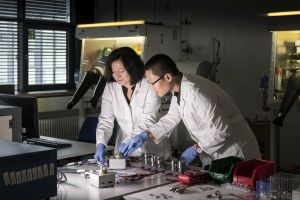New Electrolytes Push Calcium-Based Batteries Toward Replacing Lithium Ion
New electrolytes could enable a reliable, rechargeable calcium battery.
November 4, 2019

|
Zhirong Zhao-Karger (left) and Zhenyou Li (right) from the POLiS (Post Lithium Storage) Cluster of Excellence at the Karlsruhe Institute of Technology (KIT) in Germany have produced promising electrolytes for calcium batteries. (Image source: Markus Breig/KIT) |
Calcium-based batteries are one design of many that scientists are eyeing to replace lithium-ion batteries, the current industry-standard technology that is reaching its limitations in terms of next-generation energy-storage demands.
However, to date no one has discovered an electrolyte practical enough to create a reliable, rechargeable calcium battery.
This is the problem researchers at the Karlsruhe Institute of Technology (KIT) and Helmholtz Institute Ulm (HIU) have aimed to solve with recent research to produce new electrolytes based on special organic calcium salts. The researchers said the new electrolytes may be the answer to a issue that has plagued calcium-based batteries – they can’t charge at room temperature.
The team reported its findings in a paper in the journal Energy & Environmental Science.
While some electrolytes have been discovered for successful prototypes of calcium batteries, none so far have solved this problem, said Zhenyou Li, one of the researchers on the project. Li worked with project leader Zhirong Zhao-Karger as part of the POLiS (Post Lithium Storage) Cluster of Excellence, a combined KIT-HIU effort.
“For a few years now, experimental electrolytes and, hence, prototypes of the calcium battery have been available,” Li said in a press statement. “But these electrolytes enable charging at temperatures beyond 75 degrees Celsius only and, additionally, they are susceptible to undesired side reactions.”
RELATED ARTICLES:
Needs More Calcium
Calcium-based batteries are attractive to scientists because they can achieve high energy densities at low manufacturing costs, which is what the future of energy storage will demand.
Aside from performance limitations, the materials used in lithium-ion batteries also are either expensive to source or are in limited supply, said Professor Maximilian Fichtner, a scientist and research director at KIT.
“Calcium is the fifth most abundant element in the Earth’s crust,” Fichtner said in a press statement. “It is distributed homogeneously on Earth and it is safe, non-toxic, and inexpensive.”
The new electrolytes developed by the KIT-HIU team – comprised of calcium tetrakis[hexafluoroisopropyloxy]borate – are based on special organic calcium salts. According to the researchers, the electrolytes allowed for a prototype battery to be charged at room temperature during tests.
Fichtner said, while the research is “a first important step” to developing a calcium-based battery that can be used in applications such as electric vehicles, mobile electronic devices, and other storage systems, lithium-ion batteries are in no danger from being replaced just yet.
Much more research, development, and testing is needed on this and other technologies before “a mature calcium battery” is ready for widespread use, Fichtner said.
Elizabeth Montalbano is a freelance writer who has written about technology and culture for more than 20 years. She has lived and worked as a professional journalist in Phoenix, San Francisco and New York City. In her free time she enjoys surfing, traveling, music, yoga and cooking. She currently resides in a village on the southwest coast of Portugal.
About the Author(s)
You May Also Like




